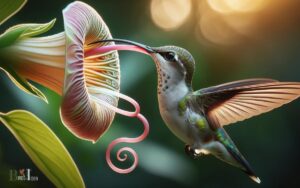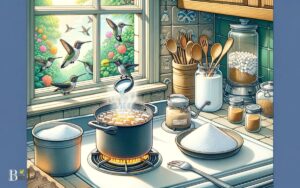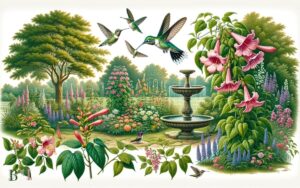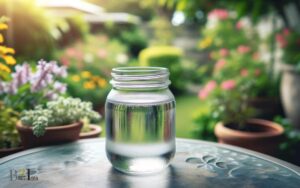Is Sugar Water Bad For Hummingbirds? No!
No, Sugar water when properly made, is not bad for hummingbirds and can be a beneficial supplemental food source, especially during times when natural nectar is scarce.
Hummingbirds require high-energy sustenance to maintain their rapid metabolism. Nectar from flowers is their natural food, but sugar water can serve as a substitute.
The key is to ensure the sugar-to-water ratio closely mimics that of natural nectar, which is about 1 part sugar to 4 parts water. It’s also crucial to avoid adding any dyes or preservatives that could harm the birds.
Providing well-maintained sugar water feeders can be a lifeline for hummingbirds during periods of food scarcity.

Key Takeaway
Hummingbird Diet and Nutrition
The hummingbird diet consists primarily of nectar from flowers, supplemented with small insects and spiders for essential proteins and nutrients.
Hummingbirds have a high metabolism and need to consume food frequently to sustain their energy levels.
Nectar provides the necessary carbohydrates for energy, while the insects and spiders offer crucial proteins, fats, vitamins, and minerals.
The consumption of nectar also aids in the pollination of flowers, making hummingbirds an essential part of the ecosystem.
It is important to note that providing a balanced diet for hummingbirds is vital for their survival, especially during migration and breeding seasons.
Understanding the nutritional needs of hummingbirds can help individuals and conservationists create suitable environments and food sources to support these remarkable birds.
Sugar Water: Pros and Cons
Although sugar water is a popular hummingbird feeder solution, its pros and cons should be carefully considered for the birds’ health and well-being.
Pros of Sugar Water:
- Provides a readily available energy source for hummingbirds.
- Mimics the nectar found in flowers, their natural food source.
- Attracts and supports hummingbirds, contributing to biodiversity.
- Can be easily and inexpensively prepared at home.
Cons of Sugar Water:
- May lack essential nutrients present in natural nectar.
- Improperly prepared or contaminated sugar water can harm hummingbirds.
- Excessive consumption can lead to health issues like obesity and diabetes in hummingbirds.
- Regular consumption may deter hummingbirds from seeking out natural sources of food.
Careful consideration of these pros and cons is vital for those seeking to provide the best care for hummingbirds.
Impact of Sugar Water on Health
Consideration of sugar water’s impact on hummingbird health is crucial for any individual or organization providing care for these delicate creatures.
While sugar water can provide a convenient and accessible energy source for hummingbirds, excessive consumption can lead to various health issues.
High sugar concentrations may disrupt the balance of nutrients in a hummingbird’s diet, leading to malnutrition and potential long-term health problems.
Moreover, sugar water can also ferment quickly in warm temperatures, leading to the growth of harmful bacteria and fungi, which can cause illness in hummingbirds.
Overconsumption of sugar water can lead to obesity and related health issues in hummingbirds.
Therefore, it is important to monitor the use of sugar water and ensure that it is offered in moderation to minimize any negative impact on the health of these remarkable birds.
Using Right Sugar Water Ratios
When it comes to feeding hummingbirds, it is crucial to pay attention to the sugar water ratios used in the feeders.
Hummingbird enthusiasts commonly use a 4:1 ratio of water to sugar when preparing sugar water for feeding these delicate birds.
This ratio closely mimics the sucrose concentration found in natural nectar sources and provides the necessary energy for hummingbirds to thrive.
When preparing sugar water for hummingbirds, it is essential to follow best practices to ensure their health and well-being.
Here are key considerations for creating the optimal sugar water solution:
- Use white, granulated sugar: Avoid using honey, brown sugar, or artificial sweeteners, as they can be harmful to hummingbirds.
- Boil the water: Boiling water helps to remove impurities and make the sugar dissolve more easily.
- Cool the solution: Ensure the sugar water solution has cooled to room temperature before filling the feeders.
- Clean the feeders regularly: To prevent mold and bacteria growth, clean and refill the feeders every 2-3 days.
Sugar Water and Migration Patterns
During migration, hummingbirds rely on sugar water as a crucial source of energy to fuel their long journeys.
As these tiny birds travel thousands of miles, they require high-energy food sources, making sugar water essential to their migration patterns.
The availability of sugar water can significantly impact their ability to complete these arduous journeys.
Here is a table highlighting the importance of sugar water in hummingbird migration patterns:
| Migration Stage | Energy Requirement | Importance of Sugar Water |
|---|---|---|
| Pre-migration | High | Provides essential energy |
| En route | Highest | Sustains energy levels |
| Arrival | High | Facilitates recovery |
Understanding the significance of sugar water in supporting hummingbird migrations emphasizes the importance of providing adequate food sources, especially during critical periods such as pre-migration and during the journey.
Why is Sugar Water a Safe and Attractive Option for Hummingbirds?
Sugar water solution for hummingbirds is a safe and attractive option because it closely mimics the nectar found in flowers. With their high metabolic rates, hummingbirds require a lot of energy, and the easily digestible sugar water provides them with a quick source of nourishment. Offering this solution in feeders also attracts these magnificent birds to your backyard, allowing you to observe and appreciate their beauty up close.
Natural Alternatives to Sugar Water
When considering natural alternatives to sugar water for hummingbirds, it is important to explore the potential for healthier hummingbird nectar.
This involves examining the benefits of natural nectar and its ability to attract hummingbirds naturally.
By investigating these points, we can better understand how to provide a more wholesome and sustainable source of nutrition for these remarkable birds.
Healthier Hummingbird Nectar
Natural alternatives to sugar water for hummingbird nectar offer a healthier option for these tiny birds’ dietary needs.
These natural alternatives not only provide essential nutrients but also reduce the risk of health issues associated with processed sugars.
Here are four healthier options for hummingbird nectar:
- Agave Nectar: A natural sweetener with a low glycemic index, providing a slower release of energy.
- Honey Water: Contains natural enzymes and antioxidants, offering additional health benefits.
- Fruit Nectar: Made by blending ripe fruits with water, providing natural sugars and essential nutrients.
- Homemade Sugar Water Alternatives: Mixtures of organic cane sugar, raw honey, or agave nectar with water, providing a more natural and wholesome alternative to refined sugar.
These natural alternatives not only support the hummingbirds’ health but also ensure a more sustainable and environmentally friendly approach to feeding these remarkable birds.
Benefits of Natural Nectar
Utilizing natural alternatives for hummingbird nectar not only promotes the birds’ well-being but also aligns with sustainable and environmentally friendly practices.
Natural nectar, such as that found in flowers, provides essential nutrients and microorganisms beneficial for the overall health of hummingbirds.
Natural nectar sources contain a balanced blend of sucrose, glucose, and fructose, mimicking the composition of floral nectar.
This supports the birds’ energy requirements and aids in maintaining their metabolic functions.
Natural nectar sources contribute to the conservation of native plants and their associated wildlife, fostering ecological balance.
By offering natural alternatives to sugar water, individuals can actively contribute to the preservation of natural habitats while providing the best possible sustenance for hummingbirds.
This approach aligns with a holistic perspective on serving these remarkable creatures and the environment.
Conclusion
The impact of sugar water on hummingbird health and migration patterns is a topic that requires careful consideration.
While sugar water can provide a convenient food source for these amazing birds, it is important to be mindful of the potential drawbacks and to explore natural alternatives. B
y balancing the conservation of hummingbirds with responsible feeding practices, we can better support their well-being and contribute to their continued presence in our environment.






